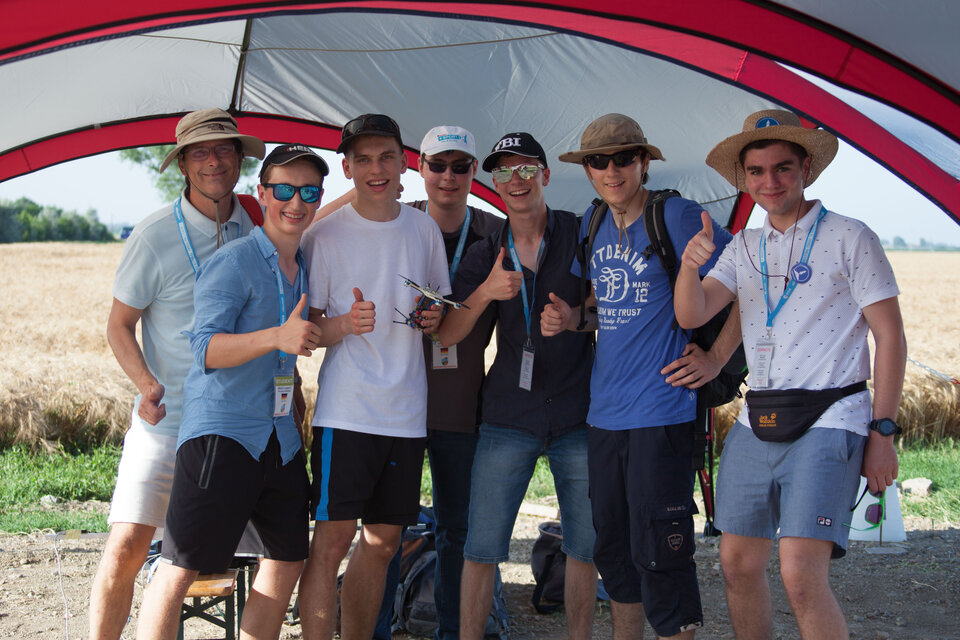Top CanSat 2019 final reports
ESA Education is pleased to announce the top four final reports submitted by student teams after they competed in the 2019 European CanSat Competition. The final launch campaign was hosted by Sierrafox in Bologna, Italy in the final week of June.
Final papers were judged by ESA and focused on the quality of the presentation and the summary of the teams’ CanSat mission results, the quality of their data analysis, the understanding of the scientific and technical principles underlying their mission, and the overall quality of the work done before, during and after the 2019 launch campaign.

The 18 papers submitted were very impressive, demonstrating the wide variety of scientific and technical achievements attained during the 2019 European CanSat Competition. It was difficult to choose the best reports but the four most outstanding reports are:
-
Charles 4th from SPŠE a VOŠ Pardubice, Czech Republic
Environmental probe to explore exoplanets in the TRAPPIST-1 system and determine the best landing site
-
STM-CanadaSat from St. Thomas More Collegiate, Canada
Creating a 3D topographical map from reference points
-
PerpetuumMobile from Elisabeth/Georg-Cantor-Gymnasium, Germany
Re-landing a CanSat with a drone landing system
-
ArctowSky from Zespół Szkół Społecznych STO im. Pawła Jasienicy, Poland
In-flight terrain mapping using Convolutions Neural Network

ESA also selected one other highly commended report:
-
Project Beta from Stanislascollege Pijnacker, The Netherlands
Safely deploy two smaller satellites (BabyCans) from the main CanSat (MotherCan) to collect data from a larger sample area
All participating teams have received their certificates, concluding the 2019 edition of the European CanSat Competition. The next edition launched on 27 September 2019. See the 2019-2020 calendar for important dates. The ESA Education team is already looking forward to the next European launch campaign taking place in June 2020.
Highlights from the 2019 CanSat launch campaign

Student teams summarise some of the highlights of year’s campaign and share their experiences:
“We have learned a lot by participating in this competition. It helped us to learn how to cooperate and improve our teamwork skills. We also learned how various technologies work and how to interpret measured data from sensors. We received a lot of valuable feedback from experts and we gained many useful contacts for our future.” Charles 4th, Czech Republic
“The CanSat experience has resulted in academic and personal growth in us all, we have not only gained more experience and knowledge, but we have also gained clarification as to what we as individuals want to push forward with in life and do in the future.” Danish Cans, Denmark

“The CanSat concept is an excellent practice opportunity for students to take their first steps in space. It gives students a first-hand experience on how a real-time satellite will be as the CanSat faces same problems like a real satellite.” CoderDojo Oradea Space Robotics, Romania
“We were very happy and proud for the possibility to take part in the project, it was very useful from the technical side but we learned a lot about the cooperation and about the team work, as well. Finally, it was very motivating to participate in the launch campaign’s international community.”GRLsat, Hungary

“Ultimately, the members went home with a true sense of purpose and an interest in the research aspects of science.By gaining a crucial understanding of the processes involved from turning a simple idea into a practical electronic product, we grasped the true meaning of science: to learn from our mistakes and to propose possible solutions to them in the future.” STM-CanadaSat, Canada
If you would like to know more about the European CanSat Competition, email cansat@esa.int. You can also find information and updates on the CanSat website and the CanSats in Europe Facebook page.


